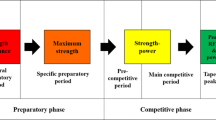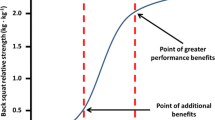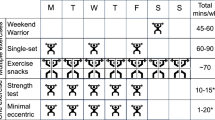Abstract
Purpose
The purpose of this study was to examine the effects of caffeine on peak torque (PT), rate of torque development (RTD), and muscle activation in college-age men.
Methods
Fifteen men (23.3 ± 2.2 years, 177.6 ± 8.7 cm, 90.3 ± 19.1 kg) volunteered to participate in this study. During each of two test sessions, maximal leg extension PT and RTD were determined and electromyographic (EMG) and mechanomyographic (MMG) signals were collected to examine electrical and mechanical aspects of muscle activation, respectively. Participants also performed the Wingate Anaerobic Test (WAnT) for the determination of peak power (PP), mean power (MP), and fatigue percentage (FP). For the first test session, participants were randomly assigned to ingest either a caffeinated drink (6 mg/kg) or a placebo 1 h prior to testing. The second test session was identical to the first, but the drink not previously administered was ingested prior to testing.
Results
The results indicated there were no significant effects of caffeine on PT, PP, MP, FP, or EMG and MMG measures. However, RTD was positively affected by caffeine (856.4 ± 246.4 Nm/s) compared to the placebo condition (710.9 ± 267.9 Nm/s).
Conclusions
These results suggest that caffeine can be an effective aid for sport activities requiring maximal rates of force or torque development during very short time periods.

Similar content being viewed by others
References
Andre T, Green M, Gann J, O’Neal E, Coates T. Effects of caffeine on repeated upper/lower body Wingates and handgrip performance. Int J Exer Sci. 2015;8(3):243–55.
Anselme F, Collomp K, Mercier B, Ahmaidi S, Prefaut C. Caffeine increases maximal anaerobic power and blood lactate concentration. Eur J Appl Physiol Occup Physiol. 1992;65(2):188–91.
Antonio J. Caffeine: the forgotten ergogenic aid. Strength Cond J. 2004;26(6):50–1.
Astorino TA, Roberson DW. Efficacy of acute caffeine ingestion for short-term high-intensity exercise performance: a systematic review. J Strength Cond Res. 2010;24(1):257–65. https://doi.org/10.1519/JSC.0b013e3181c1f88a.
Bar-Or O. The Wingate anaerobic test. An update on methodology, reliability and validity. Sports Med. 1987;4(6):381–94.
Barry DT, Cole NM. Fluid mechanics of muscle vibrations. Biophys J. 1988;53(6):899–905.
Bazzucchi I, Felici F, Montini M, Figura F, Sacchetti M. Caffeine improves neuromuscular function during maximal dynamic exercise. Muscle Nerve. 2011;43(6):839–44. https://doi.org/10.1002/mus.21995.
Beck TW, Housh TJ, Schmidt RJ, Johnson GO, Housh DJ, Coburn JW, Malek MH. The acute effects of a caffeine-containing supplement on strength, muscular endurance, and anaerobic capabilities. J Strength Cond Res. 2006;20(3):506–10.
Behrens M, Mau-Moeller A, Heise S, Skripitz R, Bader R, Bruhn S. Alteration in neuromuscular function of the plantar flexors following caffeine ingestion. Scand J Med Sci Sports. 2015;25(1):e50–8. https://doi.org/10.1111/sms.12243.
Behrens M, Mau-Moeller A, Weippert M, Fuhrmann J, Wegner K, Skripitz R, Bader R, Bruhn S. Caffeine-induced increase in voluntary activation and strength of the quadriceps muscle during isometric, concentric and eccentric contractions. Sci Rep. 2015;5(1):10209. https://doi.org/10.1038/srep10209.
Bell DG, McLellan TM. Exercise endurance 1, 3, and 6 h after caffeine ingestion in caffeine users and nonusers. J Appl Physiol. 2002;93(4):1227–34. https://doi.org/10.1152/japplphysiol.00187.2002.
Bell DG, Jacobs I, Ellerington K. Effect of caffeine and ephedrine ingestion on anaerobic exercise performance. Med Sci Sports Exerc. 2001;33(18):1399–403.
Cakir-Atabek H. Effects of acute caffeine ingestion on anaerobic cycling performance in recreationally active men. J Exerc Physiol Online. 2017;20(1):46–58.
Salatto RW, Arevalo JA, Brown LE, Wiersma LD, Coburn JW. Caffeine’s effects on an upper-body resistance exercise workout. J Strength Cond Res. 2018. https://doi.org/10.1519/JSC.0000000000002691.
Coburn JW, Housh TJ, Cramer JT, Weir JP, Miller JM, Beck TW, Malek MH, Johnson GO. Mechanomyographic and electromyographic responses of the vastus medialis muscle during isometric and concentric muscle actions. J Strength Cond Res. 2005;19(2):412–20. https://doi.org/10.1519/15744.1.
Collomp K, Ahmaidi S, Audran M, Chanal JL, Prefaut C. Effects of caffeine ingestion on performance and anaerobic metabolism during the Wingate Test. Int J Sports Med. 1991;12(5):439–43. https://doi.org/10.1055/s-2007-1024710.
Collomp K, Ahmaidi S, Chatard JC, Audran M, Prefaut C. Benefits of caffeine ingestion on sprint performance in trained and untrained swimmers. Eur J Appl Physiol Occup Physiol. 1992;64(4):377–80.
Costill DL, Dalsky GP, Fink WJ. Effects of caffeine ingestion on metabolism and exercise performance. Med Sci Sports. 1978;10(3):155–8.
Cramer JT, Housh TJ, Johnson GO, Ebersole KT, Perry SR, Bull AJ. Mechanomyographic and electromyographic responses of the superficial muscles of the quadriceps femoris during maximal, concentric isokinetic muscle actions. Isokin Exerc Sci. 2000;8(2):109–17.
Davis JK, Green JM. Caffeine and anaerobic performance: ergogenic value and mechanisms of action. Sports Med. 2009;39(10):813–32. https://doi.org/10.2165/11317770-000000000-00000.
Duncan MJ, Stanley M, Parkhouse N, Cook K, Smith M. Acute caffeine ingestion enhances strength performance and reduces perceived exertion and muscle pain perception during resistance exercise. Eur J Sport Sci. 2013;13(4):392–9. https://doi.org/10.1080/17461391.2011.635811.
Duncan MJ, Thake CD, Downs PJ. Effect of caffeine ingestion on torque and muscle activity during resistance exercise in men. Muscle Nerve. 2014;50(4):523–7. https://doi.org/10.1002/mus.24179.
Duncan MJ, Dobell AP, Caygill CL, Eyre E, Tallis J. The effect of acute caffeine ingestion on upper body anaerobic exercise and cognitive performance. Eur J Sport Sci. 2019;19(1):103–11. https://doi.org/10.1080/17461391.2018.1508505.
EFSA Panel on Dietetic Products NaA. Scientific opinion on the safety of caffeine. EFSA J. 2015;13(5):4102.
Evetovich TK, Housh TJ, Stout JR, Johnson GO, Smith DB, Ebersole KT. Mechanomyographic responses to concentric isokinetic muscle contractions. Eur J Appl Physiol Occup Physiol. 1997;75(2):166–9.
Fredholm BB, Battig K, Holmen J, Nehlig A, Zvartau EE. Actions of caffeine in the brain with special reference to factors that contribute to its widespread use. Pharmacol Rev. 1999;51(1):83–133.
Goldstein ER, Ziegenfuss T, Kalman D, Kreider R, Campbell B, Wilborn C, Taylor L, Willoughby D, Stout J, Graves BS, Wildman R, Ivy JL, Spano M, Smith AE, Antonio J. International society of sports nutrition position stand: caffeine and performance. J Int Soc Sports Nutr. 2010;7(1):5. https://doi.org/10.1186/1550-2783-7-5.
Gordon R, Holbourn HS. The sounds from single motor units in contracting skeletal muscle. J Physiol. 1948;107(4):456–64.
Graham TE. Caffeine and exercise: metabolism, endurance and performance. Sports Med. 2001;31(11):785–807.
Graham TE, Spriet LL. Metabolic, catecholamine, and exercise performance responses to various doses of caffeine. J Appl Physiol. 1995;78(3):867–74.
Graham TE, Rush JW, van Soeren MH. Caffeine and exercise: metabolism and performance. Can J Appl Physiol. 1994;19(2):111–38.
Greer F, McLean C, Graham TE. Caffeine, performance, and metabolism during repeated Wingate exercise tests. J Appl Physiol. 1998;85(4):1502–8. https://doi.org/10.1152/jappl.1998.85.4.1502.
Grgic J, Trexler ET, Lazinica B, Pedisic Z. Effects of caffeine intake on muscle strength and power: a systematic review and meta-analysis. J Int Soc Sports Nutr. 2018;15(1):11. https://doi.org/10.1186/s12970-018-0216-0.
Ivy JL, Costill DL, Fink WJ, Lower RW. Influence of caffeine and carbohydrate feedings on endurance performance. Med Sci Sports. 1979;11(1):6–11.
Jacobson BH, Edwards SW. Influence of two levels of caffeine on maximal torque at selected angular velocities. J Sports Med Phys Fit. 1991;31(2):147–53.
Jacobson BH, Weber MD, Claypool L, Hunt LE. Effect of caffeine on maximal strength and power in elite male athletes. Br J Sports Med. 1992;26(4):276–80.
Kalmar JM, Cafarelli E. Effects of caffeine on neuromuscular function. J Appl Physiol. 1999;87(2):801–8.
Kalmar JM, Cafarelli E. Caffeine: a valuable tool to study central fatigue in humans? Exerc Sport Sci Rev. 2004;32(4):143–7.
Lorino AJ, Lloyd LK, Crixell SH, Walker JL. The effects of caffeine on athletic agility. J Strength Cond Res. 2006;20(4):851–4. https://doi.org/10.1519/R-17445.1.
Madeleine P, Jorgensen LV, Sogaard K, Arendt-Nielsen L, Sjogaard G. Development of muscle fatigue as assessed by electromyography and mechanomyography during continuous and intermittent low-force contractions: effects of the feedback mode. Eur J Appl Physiol. 2002;87(1):28–37.
Orizio C, Solomonow M, Baratta R, Veicsteinas A. Influence of motor units recruitment and firing rate on the soundmyogram and EMG characteristics in cat gastrocnemius. J Electromyogr Kinesiol. 1992;2(4):232–41. https://doi.org/10.1016/1050-6411(92)90026-f.
Park ND, Maresca RD, McKibans KI, Morgan DR, Allen TS, Warren GL, metabolism e. Caffeine’s beneficial effect on maximal voluntary strength and activation in uninjured but not injured muscle. Int J Sport Nutr Exerc Metab. 2008;18(6):639–52.
Ribeiro JA, Sebastiao AM. Caffeine and adenosine. J Alzheimers Dis. 2010;20(Suppl 1):S3–15. https://doi.org/10.3233/JAD-2010-1379.
Shearer J, Graham TE. Performance effects and metabolic consequences of caffeine and caffeinated energy drink consumption on glucose disposal. Nutr Rev. 2014;72(Suppl 1):121–36. https://doi.org/10.1111/nure.12124.
Spriet LL. Exercise and sport performance with low doses of caffeine. Sports Med. 2014;44(Suppl 2):S175–84. https://doi.org/10.1007/s40279-014-0257-8.
Stokes MJ. Acoustic myography: applications and considerations in measuring muscle performance. Isokinet Exerc Sci. 1993;3(1):4–15.
Trevino MA, Coburn JW, Brown LE, Judelson DA, Malek MH. Acute effects of caffeine on strength and muscle activation of the elbow flexors. J Strength Cond Res. 2015;29(2):513–20. https://doi.org/10.1519/JSC.0000000000000625.
Walton C, Kalmar JM, Cafarelli E. Effect of caffeine on self-sustained firing in human motor units. J Physiol. 2002;545(2):671–9.
Walton C, Kalmar J, Cafarelli E. Caffeine increases spinal excitability in humans. Muscle Nerve. 2003;28(3):359–64. https://doi.org/10.1002/mus.10457.
Warren GL, Park ND, Maresca RD, McKibans KI, Millard-Stafford ML. Effect of caffeine ingestion on muscular strength and endurance: a meta-analysis. Med Sci Sports Exerc. 2010;42(1):1375–87. https://doi.org/10.1249/MSS.0b013e3181cabbd8.
Williams JH, Barnes WS, Gadberry WL. Influence of caffeine on force and EMG in rested and fatigued muscle. Am J Phys Med. 1987;66(4):169–83.
Zatsiorsky VM, Kraemer WJ. Science and practice of strength training. Champaign, IL: Human Kinetics; 2006.
Author information
Authors and Affiliations
Contributions
BMP: significant manuscript writer; significant manuscript reviewer/reviser; concept and design; data acquisition; data analysis and interpretation. LEB: significant manuscript reviewer/reviser; concept and design; data acquisition; data analysis and interpretation. DAJ: significant manuscript reviewer/reviser; concept and design; data analysis and interpretation. SGR: data acquisition; data analysis and interpretation. JWC: significant manuscript writer; significant manuscript reviewer/reviser; concept and design; data acquisition; data analysis and interpretation. On behalf of all authors, the corresponding author states that there is no conflict of interest.
Corresponding author
Rights and permissions
About this article
Cite this article
Peterson, B.M., Brown, L.E., Judelson, D.A. et al. Caffeine Increases Rate of Torque Development Without Affecting Maximal Torque. J. of SCI. IN SPORT AND EXERCISE 1, 248–256 (2019). https://doi.org/10.1007/s42978-019-00048-y
Received:
Accepted:
Published:
Issue Date:
DOI: https://doi.org/10.1007/s42978-019-00048-y




